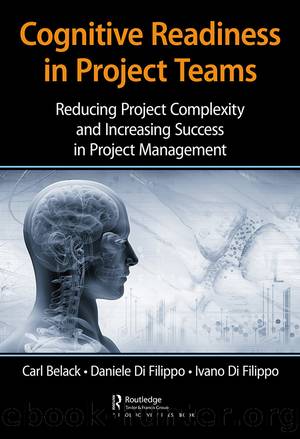Cognitive Readiness in Project Teams by Belack Carl;Di Filippo Daniele;Di Filippo Ivano;

Author:Belack, Carl;Di Filippo, Daniele;Di Filippo, Ivano;
Language: eng
Format: epub
Publisher: Taylor & Francis (CAM)
Published: 2019-01-20T00:00:00+00:00
Spiritual Intelligence
The idea that no one is an individual alone but is part of a unified system interacting with one another has emerged from neuroscientific studies of the influences of social interaction on the brain. This point is where the more concrete intelligences or intelligences that can be subjected to metrics or empirical evidenceâcognitive, emotional, and socialâbegin to flow into the realm of spiritual intelligence.
Project managers, particularly in volatile, uncertain, complex, and ambiguous projects, do well when they operate with a higher degree of spiritual intelligence. It helps them to see the big picture and be less likely to be biased in their decision-making or interactions. Biases are discussed in Chapter 4.
Spiritual intelligence is not linked to any religion. It is a fundamental capacity, like any intelligence, which can be cultivated and enhanced. It encompasses âwisdom,â knowing the nature of the universe, including oneâs own inner workings, ethics, and acting skillfully to do no harm and help, if one can. Spiritual intelligence is the capacity to go beyond the concrete material realm into the transcendent. It involves the ability to transform the experiential knowledge of self and the nature of the universe into skillful, practical, compassionate action, while being calm and accepting under most conditions.
Spiritual intelligence is becoming increasingly part of the mainstream in the discussion of the basic intelligences, as neuroscientists are influencing psychologists and validating some of the ancient wisdom carried in spiritual philosophies. The psychologists and philosophers are bringing spiritual intelligence into organizations, as a means for influencing values such as the acceptance of diversity, win-win conflict management, social responsibility, stress management, and teamwork.
Spiritual intelligence is the central and most fundamental of all the intelligences, because it becomes the source of guidance for the others.*
The spiritually intelligent person recognizes a universal consciousness that is behind their individual identities, thoughts, and mental concepts. They are comfortable with paradox, irrationality, setbacks, and continuous change.
Robert Emmons boils spiritual intelligence down to five capabilities: transcending the physical and material; experience of heightened states of consciousness; seeing day-to-day experience as sacred; using spiritual methods such as prayer, meditation, and contemplation to address problems; and a tendency to be virtuous and oriented to the benefit of others as well as oneself.â For the project manager, the ability to treasure the day-to-day experiences involved in project work is necessary for inner wellbeing, as well as the wellbeing of the team. The project manager avoids emotional disruptions within the team, as well as self, by focusing on the benefit of the others and the whole, the team. By focusing on the experience of the day-to-day and maintaining an acceptance of the learning that comes from such experiences, the project or program manager conveys to the team a leader that is less erratic, more centered, and more focused on the team and stakeholders than the issue of the day. Such project or program managers are often viewed as leaders, problem-solvers, or those individuals in control because of the calm demeanor that is conveyed from the view of the experience of the day-to-day being sacred.
Download
This site does not store any files on its server. We only index and link to content provided by other sites. Please contact the content providers to delete copyright contents if any and email us, we'll remove relevant links or contents immediately.
Bullshit Jobs by David Graeber(3958)
Radical Candor by Kim Scott(2595)
I Am Right, You Are Wrong by Edward De Bono(2348)
23:27 by H. L. Roberts(2155)
Nomadland by Jessica Bruder(1976)
Average Is Over by Tyler Cowen(1763)
The Conflict Resolution Phrase Book by Barbara Mitchell & Cornelia Gamlem(1685)
Out of Our Minds: Learning to Be Creative by Ken Robinson(1635)
High-Impact Interview Questions by Victoria A. Hoevemeyer(1620)
The Ideal Team Player by Patrick M. Lencioni(1573)
An Everyone Culture: Becoming a Deliberately Developmental Organization by Robert Kegan & Lisa Laskow Lahey(1536)
The Asshole Survival Guide by Robert I. Sutton(1515)
Automatic Society by Bernard Stiegler(1475)
Who by Street Randy & Smart Geoff(1431)
Unleashed by Anne Morriss & Frances Frei(1430)
Who Moved My Cheese?: An Amazing Way to Deal With Change in Your Work and in Your Life by Johnson Spencer(1423)
42 Rules of Employee Engagement by Susan Stamm(1406)
96 Great Interview Questions to Ask Before You Hire by Paul Falcone(1363)
The Power of Disability by Al Etmanski(1298)
